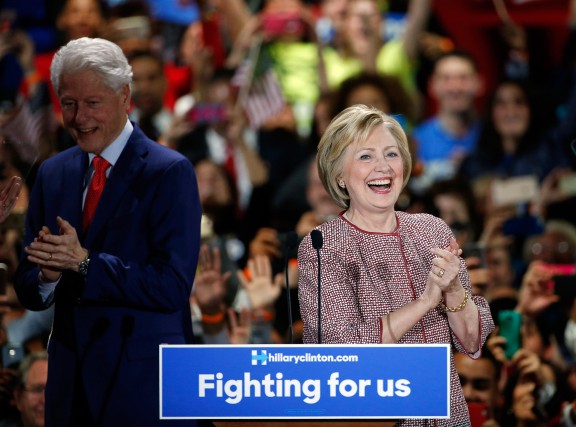
“Victory is in sight,” Hillary Clinton exclaimed late Tuesday evening, with a big, bright smile on her face. She dominated her rival Bernie Sanders in New York.
It is impossible to prove her wrong. By winning in one of the country’s most populous states, she has interrupted her rival’s momentum. She also proved, beyond any doubt, that her lead among Democrats is now nearly insurmountable.
And undeniable. For at least three reasons:
• Since January, she has received the support of some 10 million voters, about 2.6 million more than Bernie Sanders, from one end of the country to the next;
• She has won more primaries than her rival since the beginning of the primary and caucus season: 21 to 17; and
• She has taken a commanding delegate lead, which, in this nomination contest, represents the main ingredient. At the end of the polling in New York, she held 1428 delegates, about 300 more than her rival. To this total, it’s necessary to add more than 500 superdelegates, representatives of the Democratic Party establishment who support her. She’s approaching the magic number. One needs at least 2383 delegates to win.
We can thus predict today that, unless a miracle happens, Bernie Sanders’ hopes will be crushed.
We have already reported on the Vermont senator’s essential contribution to the debates at the beginning of the race. Let’s now highlight how Democratic voters, by throwing their support behind Hillary Clinton, have made a good choice.
Because, despite certain apparent flaws and her slight baggage, the former secretary of state is still more likely than Sanders to win in a race against the Republican nominee during the general presidential election.
This is what a large number of Democrats seem to believe, according to voter surveys on Tuesday. In New York, 85 percent of voters who ultimately were voting for the candidate they thought could win the presidential bid in November chose Clinton.
Republicans are not yelling it from the rooftops, but they share that opinion. Strategists have admitted that they would happily face Sanders, this “socialist who went to the USSR for his honeymoon,” as one of them recently declared. His ideas are definitely more progressive than those of the average American, and his lack of experience in foreign affairs is also perceived as a major handicap.
Among Republicans, the game is not yet over. But if the rules of the game do not change before the July convention, the party candidate will be an unpredictable and bitter demagogue (Donald Trump) or a super conservative with old traditional values (Ted Cruz).*
Neither the United States nor the rest of the world can run the risk of having either of these two Republicans in the White House. That’s why Clinton’s likely victory over Sanders is encouraging news for things to come.
*Editor’s note: Sen. Ted Cruz suspended his campaign for the presidency on May 3, 2016.

I would suggest sources other than the US mainstream media would provide a more nuanced view of the current status of the Democratic Party primary. Sen. Sanders has stated unequivocally he intends to continue his campaign through to the party convention in July, and the level of support he has among the disenfranchised continues to soar. Furthermore, it has become more and more apparent there have been irregularities in the previous elections. As for his alleged lack of experience in foreign affairs, I can assure you his many years in the US Congress is quite adequate, since it equals that of many previous presidents.
I will also note that if you’re concerned about having Mr. Trump in the White House, you might also want to be concerned with having Ms. Clinton there as well, given her history of militant response.